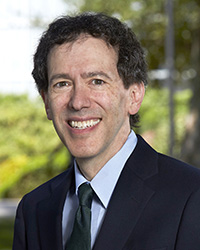Dr. David Orentlicher

What's an important thing you are working on right now?
Come November, I’ll be serving in the Nevada Assembly, and I’ve been thinking about potential legislation that I might propose during the 2021 session. For example, even with the Affordable Care Act, our health care system suffers from problems of access. To address that, I’m looking into ways to increase Medicaid funding so the program does a better job serving the health care needs of lower-income Nevadans. The federal government gives states a very good incentive to fully fund Medicaid. For every new dollar in state spending, we get an additional two dollars in federal funding. It’s a great return on our investment in the public’s health.
What is the most significant issue facing your field and how should it be addressed?
I teach constitutional law, and we’ve seen too great an accumulation of power in the Oval Office. The Framers of the Constitution rested policy-making authority with Congress, but a combination of legislative abdication and presidential expropriation has given us an “imperial presidency.” Presidents decide when our troops engage in combat, whether to fight trade wars, and how to regulate air quality, energy exploration, education, health care, consumer protection, and many other concerns. But no single official should exercise so much power. Other countries have protected against an imperial presidency by resting executive power in a cabinet of officials that share power. And by making sure that all major parties are represented in the cabinet, other countries also have limited partisan conflict.
How does your research influence your service and vice versa?
There are so many nice synergies between research and service. My research helps me identify promising policies to address the concerns of my constituents when I serve as an elected official. When I taught at Indiana University and represented a state house district fifteen years ago, I sponsored legislation to lower the cost of health care insurance, protect children from abuse, and increase funding for start-up companies so they can create new jobs. After resuming teaching full-time, I was able to draw on my experience with partisan conflict to write a book on how we might defuse political polarization. I’m looking forward to returning to legislative service and trying to implement some of the lessons from my recent research on lowering health care costs.